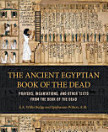A Search in Secret Egypt
নৱে ২০১৫ · North Atlantic Books
৪.৪star
৮ টা পৰ্যালোচনাreport
ইবুক
380
পৃষ্ঠা
reportমূল্যাংকন আৰু পৰ্যালোচনা সত্যাপন কৰা হোৱা নাই অধিক জানক
এই ইবুকখনৰ বিষয়ে
In this book, philosopher Paul Brunton (1898-1981) encounters the mysteries and magic of Egypt in the 1930s, including an eerie yet illuminating night spent alone inside the Great Pyramid. Alongside his explorations of ancient Egypt's monuments and gods, Brunton encounters a variety of occultists, fakirs, and dervishes, and even manages to become initiated into the deadly art of snake charming. His frank interviews with Muslim leaders remain relevant today, and his description of the Hajj reflects the beauty and inspiring faith of Mohammad's true followers. Brunton's journey to discover the furthest reaches of what the mind and body are capable of--and to distinguish various forms of yoga and magic from true spirituality--lead him to the myth of Osiris and to the mystery that is the Sphinx itself. In the end, Brunton turns his attention to his own spiritual path, connecting all of his experiences into a single discovery: that we are more than the body and that the freedom of our spirit can be experienced here and now. This new edition has been updated to incorporate Brunton's final revisions and includes an introduction by the Paul Brunton Philosophic Foundation.
"Paul Brunton was a great original and got to a place of personal evolution that illumines the pathways of a future humanity." --Jean Houston, author of A Passion for the Possible and A Mythic Life
"Any serious man or woman in search of spiritual ideas will find a surprising challenge and an authentic source of inspiration and intellectual nourishment in the writings of Paul Brunton."--Jacob Needleman, author of What is God?
"Paul Brunton was a great original and got to a place of personal evolution that illumines the pathways of a future humanity." --Jean Houston, author of A Passion for the Possible and A Mythic Life
"Any serious man or woman in search of spiritual ideas will find a surprising challenge and an authentic source of inspiration and intellectual nourishment in the writings of Paul Brunton."--Jacob Needleman, author of What is God?
মূল্যাংকন আৰু পৰ্যালোচনাসমূহ
৪.৪
৮ টা পৰ্যালোচনা
লিখকৰ বিষয়ে
PAUL BRUNTON (1898-1981) is one of the twentieth century's most brilliant spiritual writers. He is generally recognized as having introduced yoga and meditation to the West. His books sold over two million copies in 17 languages. He was the most popular and authoritative source of information on Eastern philosophies, gurus, and meditation systems from the mid-'30s to the '60s. In 1954, he withdrew from public life and continued writing the material that was posthumously published as The Notebooks of Paul Brunton--a truly East-West spiritual philosophy. Written with the passion of an authentic pioneer and the thoughtfulness of a seasoned practitioner, his work is re-emerging as a beacon for all contemporary seekers.
এই ইবুকখনক মূল্যাংকন কৰক
আমাক আপোনাৰ মতামত জনাওক।
পঢ়াৰ নির্দেশাৱলী
স্মাৰ্টফ’ন আৰু টেবলেট
Android আৰু iPad/iPhoneৰ বাবে Google Play Books এপটো ইনষ্টল কৰক। ই স্বয়ংক্রিয়ভাৱে আপোনাৰ একাউণ্টৰ সৈতে ছিংক হয় আৰু আপুনি য'তে নাথাকক ত'তেই কোনো অডিঅ'বুক অনলাইন বা অফলাইনত শুনিবলৈ সুবিধা দিয়ে।
লেপটপ আৰু কম্পিউটাৰ
আপুনি কম্পিউটাৰৰ ৱেব ব্রাউজাৰ ব্যৱহাৰ কৰি Google Playত কিনা অডিঅ'বুকসমূহ শুনিব পাৰে।
ই-ৰীডাৰ আৰু অন্য ডিভাইচ
Kobo eReadersৰ দৰে ই-চিয়াঁহীৰ ডিভাইচসমূহত পঢ়িবলৈ, আপুনি এটা ফাইল ডাউনল’ড কৰি সেইটো আপোনাৰ ডিভাইচলৈ স্থানান্তৰণ কৰিব লাগিব। সমৰ্থিত ই-ৰিডাৰলৈ ফাইলটো কেনেকৈ স্থানান্তৰ কৰিব জানিবলৈ সহায় কেন্দ্ৰত থকা সবিশেষ নিৰ্দেশাৱলী চাওক।







